NHL Stadium Series Brought National and International Attention to Wolfpack Country
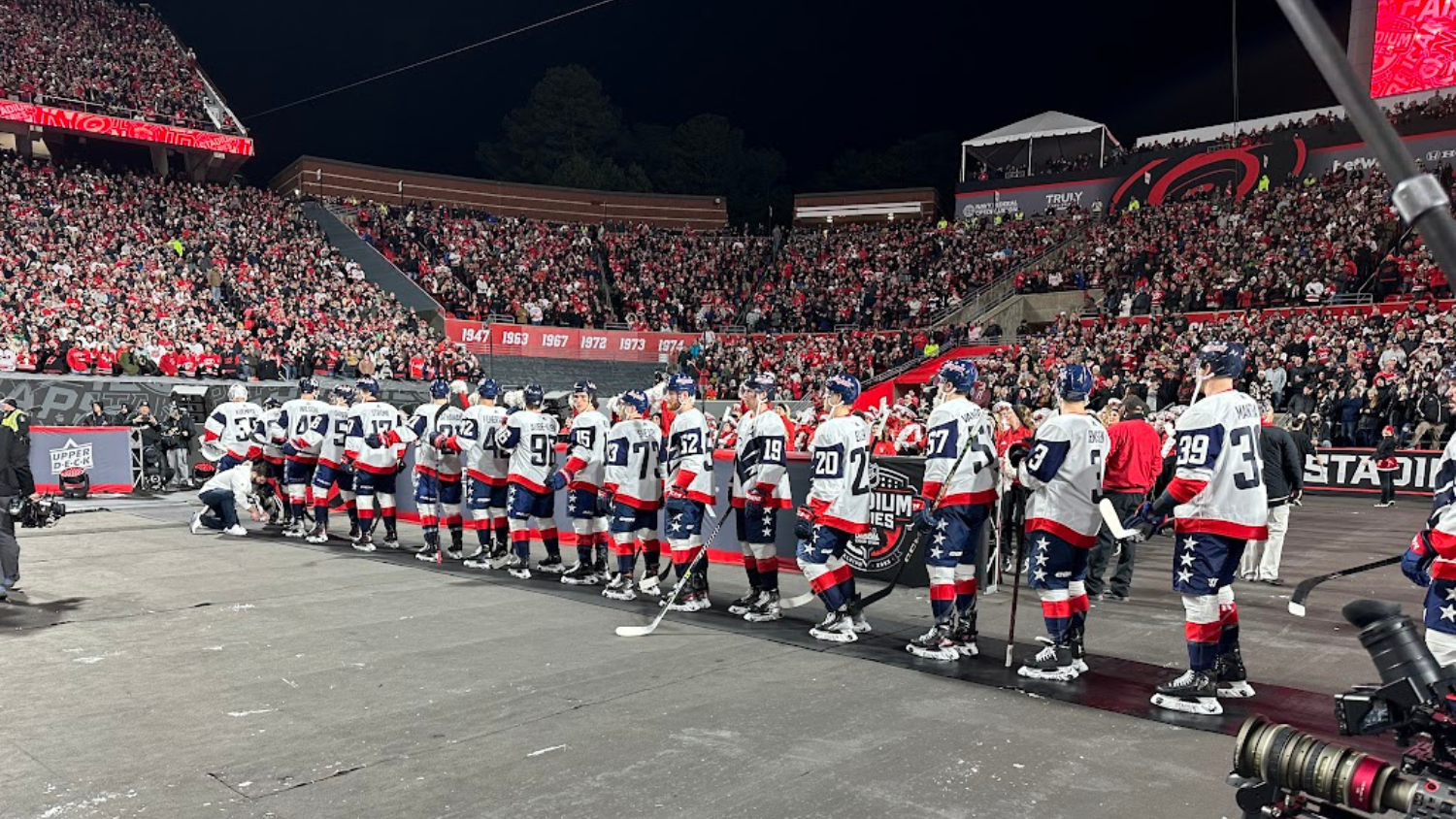
According to the figures released by Visit Raleigh, the National Hockey League (NHL) Stadium Series game between the Hurricanes and Capitals at Carter-Finley Stadium on Saturday, February 18th, generated $13.6 million in total economic impact. The full NHL Stadium Series weekend, which consisted of the Hurricanes’ home game against the Canadiens on Thursday, Hurricanes FanFest presented by UNC Health and the Hootie & the Blowfish concert on Friday, the Stadium Series game and Truly Hard Seltzer NHL PreGame official fan festival on Saturday and the men’s basketball game between UNC and NC State on Sunday, generated $20.1 million in total economic impact.
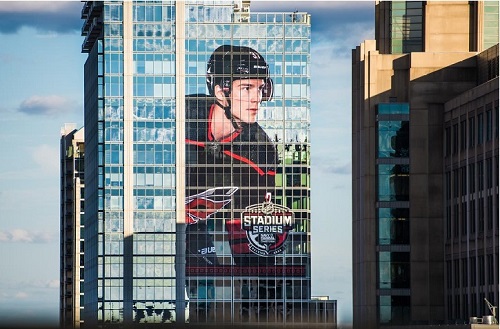
For a market that faced an uphill climb in establishing credibility when Raleigh hosted the 2004 NHL Draft and Game 7 of the 2006 Stanley Cup Finals, the Triangle is now considered a mainstay hockey market. To pull off a successful Stadium Series event, the city collaborated with the NHL, Wake County, the state of North Carolina and PNC Arena, as well as NC State to combine resources and making accommodations to facilitate an outdoor hockey game and create several days of excitement around it. Perhaps it’s not surprising that Raleigh was recently designated the No. 1 Sports Host City in the United States by SportsTravel Magazine.
Building the field of dreams
The Stadium Series event marked the first time the Hurricanes have participated in an outdoor game and Carter-Finley Stadium became the sixth college football facility to host an NHL outdoor games joining Michigan Stadium, Navy-Marine Corps Memorial Stadium (Navy), TCF Bank Stadium (University of Minnesota), Notre Dame Stadium and Falcon Stadium (Air Force).
To convert an outdoor field to an official ice hockey rink, the NHL brings in a “Dream Team” of ice makers and specialists from across two countries who come together for about six weeks each time there is an outdoor game. In 2023, the Dream Team spent about six weeks in Boston to prepare for a hockey game at Fenway Park. They returned home for about 10 days and then came to Raleigh to prepare the field at Carter-Finley Stadium.
Once in Wolfpack country, the Dream Team worked with members of the Hurricane’s “Ice Crew” which currently includes two full-time employees at PNC Arena and four part-time employees including Robb Wade, director of the PGA golf management program in NC State’s department of parks, recreation and tourism management.
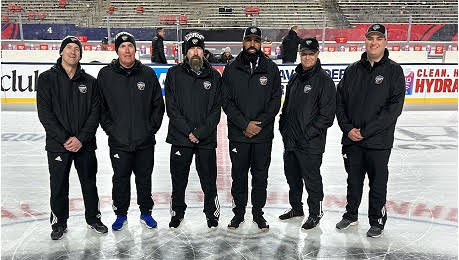
Preparation began several weeks before the event starting with putting down tarps and plywood to create a level surface on the existing football field. Next, the NHL crew brought in refrigeration trucks to run a coolant underneath the rink to transfer heat away from the surface. The crew then builds up the ice until it is two inches thick higher than the 1 1/4 inches required in an indoor NHL rink. The system that maintains the ice can keep the ice in good shape as long as the temperature does not go above 55 degrees.
“One of the big challenges came the Friday before the game when the temperature was about 60 degrees and then it started raining,” said Wade. “The system can handle warmth OR rain, but not warm rain. So, the crew brought out two tractors with water ploughs on the front to push all the rain water off the ice because the ice was melting under the warm rain.”
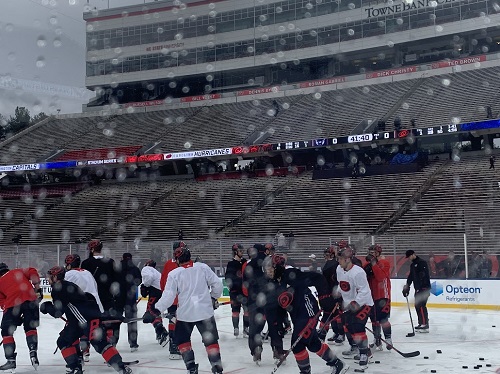
Neither glorious or glamorous, the work required to transform a football field into an ice hockey rink is serious business. Once the rain stopped and the sun went down, the temperature dropped rapidly. Both teams had a chance to practice and enjoy a family skate as did referees and linesmen. Then the crew took to watering the ice.
“We stayed until about 4 am flooding the ice by hand,” explained Wade. “More water can be spread using this method as opposed to using the Olympia machines. The ice was then covered with insulation which stayed in place on Game Day until the sun went down behind the press box at the football stadium and the ice was completely in the shadows.”
The Ice Crew removed the cover so Olympia machines could return to the ice and start the smoothing process and this continued right up until the beginning of the game.
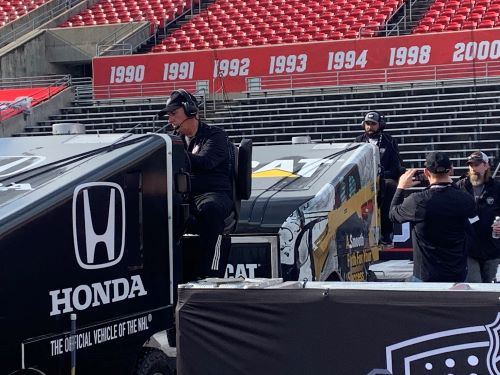
Wade and the Ice Crew also small jobs, such as cleaning the plexiglass from the inside and the outside, so that fans, media and tv cameras would have the most clear view possible of the game. They move mats around for the puck drop, pick up warm up pucks and set up nets for the game.
“During the game, we shovel excess snow from the ice during the tv time outs to try to create the best and fastest surface possible for the players,” said Wade. “That takes place during each of the three media time outs that occur in each of the three periods. After the game, we remove the nets from the ice and just make sure that no one comes onto the ice that is not supposed to be there.”
Allowing fans on the field
The Dream Team and Ice Crew were not the only ones with a great view of the action. For the first time in NHL’s history of hosting outdoor games, a group of fans got to be on the field in a general admission section. Around 800 NC State students were able to buy tickets on the field to create a festive atmosphere with Final Four-like seating. Other local touches included having the NC State marching band play and Ripkin the Bat Dog leading the ceremonial puck drop.
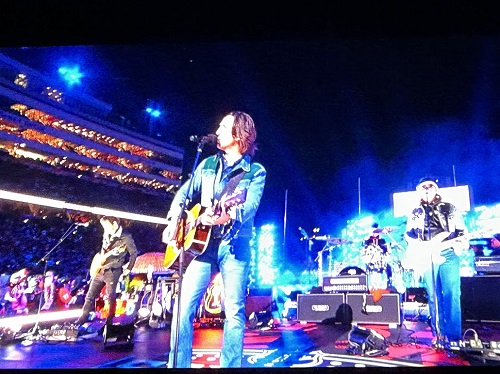
Extending hockey to underrepresented communities in Raleigh
The Hurricanes and NHL are committed to creating another entry point for children to learn the sport through access to ball hockey — especially for underrepresented and adaptive communities — as part of a larger mission to make a positive impact in the community both on and off the ice throughout the region. Both organizations will be making a joint donation to long-term sustainable ball hockey programming for underrepresented communities in Raleigh, with a focus on growing sled hockey and special hockey. The latter was created to give people with cognitive or developmental disabilities the chance to play ice hockey in an environment that works for them.
A case study in successful sport management
The NHL Stadium Series is a prime example of how the success or failure of a sport program isn’t just related tow hat happens on the field. There is a cohort of people behind the scenes who bring events to life.
“To me, the most amazing thing about the Stadium Series event at Carter-Finley was how hundreds of people worked together to get hundreds of jobs done,” said Wade. “It was a tremendous example of people coming together to create an experience and a memory that will not be forgotten. For me, it was very exciting and educational to get an inside look at just what it takes to put on such a phenomenal event.”
Among the many collaborative events that took place during the Stadium Series in Raleigh was a free club hockey game between NC State and UNC that drew approximately 25, 000 fans. It’s true; UNC does have a hockey team. Carolina Hockey plays on the club level, so players actually pay to take the ice and face off against fellow hockey teams.
From youth hockey games on Saturday mornings to national hockey events in stadiums, all sporting events require planning, promotion, management, and more. NC State’s sport management program takes students from being just fans and teaches them about the planning, marketing, venue management, public and community relations and accounting required to ensure a sport will benefit and ideally improve a community. The Carolina Hurricanes and NC State’s department of parks, recreation and tourism management have a rich history of working together. Many students interested in sport and entertainment venue management have completed internships with Raleigh’s professional ice hockey team.